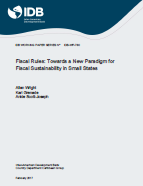Fiscal Rules: Towards a New Paradigm for Fiscal Sustainability in Small States
Date
Feb 2017
This study contends that Caribbean countries cannot adequately surmount their fiscal and debt challenges in the absence of binding rules that are geared toward entrenching fiscal discipline, curbing fiscal procyclicality, and improving budget transparency and credibility. Distilling global lessons and taking due cognizance of Caribbean countries' idiosyncrasies, the paper explores key technical, operational and institutional issues in the design, implementation, and monitoring of fiscal rules that might be relevant for Caribbean countries that currently do not have legislated rules. Results from simulations carried out to determine welfare effects and the extent of volatility of key macroeconomic variables under various fiscal rules scenarios suggest that of the different types of simulated fiscal rules, expenditure rules perform best in terms of reducing macroeconomic volatility, and in that regard, appear to be the most welfare-enhancing. This is believed to be the first study to carry out such a simulation exercise for Caribbean countries. The findings of the study evince useful insights for policymakers on how to improve the design and conduct of fiscal policy for better fiscal and, by extension, development outcomes.



